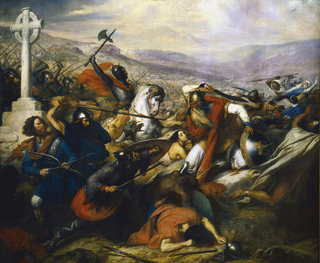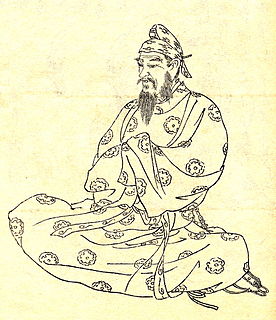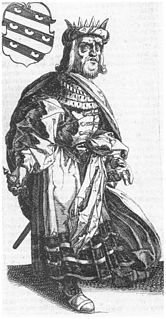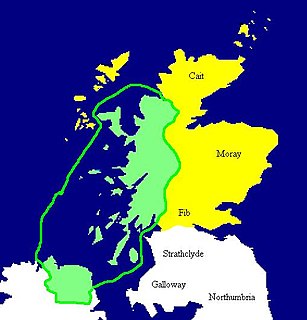Related Research Articles

Year 714 (DCCXIV) was a common year starting on Monday of the Julian calendar. The denomination 714 for this year has been used since the early medieval period, when the Anno Domini calendar era became the prevalent method in Europe for naming years.

Year 731 (DCCXXXI) was a common year starting on Monday of the Julian calendar. The denomination 731 for this year has been used since the early medieval period, when the Anno Domini calendar era became the prevalent method in Europe for naming years.
The 720s decade ran from January 1, 720, to December 31, 729.
The 710s decade ran from January 1, 710, to December 31, 719.

Year 710 (DCCX) was a common year starting on Wednesday of the Julian calendar. The denomination 710 for this year has been used since the early medieval period, when the Anno Domini calendar era became the prevalent method in Europe for naming years.

Year 740 (DCCXL) was a leap year starting on Friday of the Julian calendar, the 740th year of the Common Era (CE) and Anno Domini (AD) designations, the 740th year of the 1st millennium, the 40th year of the 8th century, and the 1st year of the 740s decade. The denomination 740 for this year has been used since the early medieval period, when the Anno Domini calendar era became the prevalent method in Europe for naming years.

Year 732 (DCCXXXII) was a leap year starting on Tuesday of the Julian calendar. The denomination 732 for this year has been used since the early medieval period, when the Anno Domini calendar era became the prevalent method in Europe for naming years.

Year 737 (DCCXXXVII) was a common year starting on Tuesday of the Julian calendar. The denomination 737 for this year has been used since the early medieval period, when the Anno Domini calendar era became the prevalent method in Europe for naming.

Year 718 (DCCXVIII) was a common year starting on Saturday of the Julian calendar. The denomination 718 for this year has been used since the early medieval period, when the Anno Domini calendar era became the prevalent method in Europe for naming years.

Year 720 (DCCXX) was a leap year starting on Monday of the Julian calendar. The denomination 720 for this year has been used since the early medieval period, when the Anno Domini calendar era became the prevalent method in Europe for naming years.

Year 713 (DCCXIII) was a common year starting on Sunday of the Julian calendar. The denomination 713 for this year has been used since the early medieval period, when the Anno Domini calendar era became the prevalent method in Europe for naming years.

Year 716 (DCCXVI) was a leap year starting on Wednesday of the Julian calendar. The denomination 716 for this year has been used since the early medieval period, when the Anno Domini calendar era became the prevalent method in Europe for naming years.

Year 719 (DCCXIX) was a common year starting on Sunday of the Julian calendar. The denomination 719 for this year has been used since the early medieval period, when the Anno Domini calendar era became the prevalent method in Europe for naming years.

Year 733 (DCCXXXIII) was a common year starting on Thursday of the Julian calendar. The denomination 733 for this year has been used since the early medieval period, when the Anno Domini calendar era became the prevalent method in Europe for naming years.

Year 721 (DCCXXI) was a common year starting on Wednesday of the Julian calendar. The denomination 721 for this year has been used since the early medieval period, when the Anno Domini calendar era became the prevalent method in Europe for naming years.
Year 725 (DCCXXV) was a common year starting on Monday of the Julian calendar. The denomination 725 for this year has been used since the early medieval period, when the Anno Domini calendar era became the prevalent method in Europe for naming years.

Year 734 (DCCXXXIV) was a common year starting on Friday of the Julian calendar. The denomination 734 for this year has been used since the early medieval period, when the Anno Domini calendar era became the prevalent method in Europe for naming years.

Year 736 (DCCXXXVI) was a leap year starting on Sunday of the Julian calendar. The denomination 736 for this year has been used since the early medieval period, when the Anno Domini calendar era became the prevalent method in Europe for naming years.

Year 738 (DCCXXXVIII) was a common year starting on Wednesday of the Julian calendar. The denomination 738 for this year has been used since the early medieval period, when the Anno Domini calendar era became the prevalent method in Europe for naming years.

Year 739 (DCCXXXIX) was a common year starting on Thursday of the Julian calendar. The denomination 739 for this year has been used since the early medieval period, when the Anno Domini calendar era became the prevalent method in Europe for naming years.
References
- ↑ "History of the Byzantine Empire, SECTION II REIGN OF LEO III (THE ISAURIAN) A.D. 717-741, George Finlay, 1906". Archived from the original on July 15, 2018. Retrieved April 5, 2020.
- ↑ Kazhdan 1991, p. 415
- ↑ "Three Millennia of German Brewing". Archived from the original on 30 November 2016.
- ↑ David Nicolle (2008). Poitiers AD 732, Charles Martel turns the Islamic tide (p. 41). ISBN 978-184603-230-1
- ↑ David Nicolle (2008). Poitiers AD 732, Charles Martel turns the Islamic tide (p. 19). ISBN 978-184603-230-1
- ↑ Blankinship (1994), pp. 156, 157
- ↑ Kennedy (2001), p. 29
- ↑ Kennedy (2007), p. 285
- ↑ Herbermann, Charles, ed. (1913). . Catholic Encyclopedia . New York: Robert Appleton Company.
- ↑ Treadgold, p. 354
- ↑ David Nicolle (2008). Poitiers AD 732, Charles Martel turns the Islamic tide (p. 45). ISBN 978-184603-230-1
- 1 2 David Nicolle (2008). Poitiers AD 732, Charles Martel turns the Islamic tide (p. 19). ISBN 978-184603-230-1
- ↑ David Nicolle (2008). Poitiers AD 732, Charles Martel turns the Islamic tide (p. 55). ISBN 978-184603-230-1
- ↑ David Nicolle (2008). Poitiers AD 732, Charles Martel turns the Islamic tide (p. 66). ISBN 978-184603-230-1
- ↑ Durant, Will, The Age of Faith. New York: Simon and Schuster (1950). OCLC 225699907. Page, 461. Originally published 1939. ISBN 978-0-671-41800-7
- ↑ Schwabe, Calvin W. (1979). Unmentionable Cuisine, Charlottesville: University of Virginia Press (p. 157). ISBN 0813908116
- ↑ Mayr-Harting, Oxford Dictionary of National Biography
- ↑ Duffy, p. 64; Mann, p. 207
- ↑ David Nicolle (2008). Poitiers AD 732, Charles Martel turns the Islamic tide (p. 19). ISBN 978-184603-230-1
- ↑ David Nicolle (2008). Poitiers AD 732, Charles Martel turns the Islamic tide (p. 83). ISBN 978-184603-230-1
- ↑ "Geschiedenis van het volk der Friezen". Boudicca.de. Archived from the original on June 8, 2009. Retrieved 2009-01-22.
- ↑ David Nicolle (2008). Poitiers AD 732, Charles Martel turns the Islamic people (p. 19). ISBN 978-184603-230-1
- ↑ Lei, Z.-S. (March 2007). "Textual research on the Tianshui M 7 earthquake in 734 AD and analysis of its causative structure". ResearchGate . Retrieved June 9, 2021.
- ↑ Pierre Riche, The Carolingians: A family who forged Europe, Transl. Michael Idomir Allen, (University of Pennsylvania Press, 1993), p. 44.
- ↑ Guidoboni, Traina, 1995, p. 119-120
- ↑ Golden, Peter B. (2010). Turks and Khazars: origins, institutions, and interactions in pre-Mongol Eurasia. Farnham, England: Ashgate/Variorum. ISBN 978-1-4094-0003-5.
- ↑ Mayr-Harting, "Ecgberht (d. 766)". Oxford Dictionary of National Biography.
- ↑ David Nicolle (2008). Poitiers AD 732, Charles Martel turns the Islamic tide (p. 19). ISBN 978-184603-230-1
- ↑ Riche, Pierre (1993). The Carolingians: A Family Who Forged Europe. University of Pennsylvania Press, p. 45. ISBN 0-8122-1342-4
- ↑ "Anglo-Saxons.net: S 89" . Retrieved 27 April 2007.
- ↑ Fletcher, Who's Who, pp. 98–100
- ↑ Lynch, Michael (ed.). The Oxford companion to Scottish history. Oxford University Press. p. 180. ISBN 9780199693054.
- ↑ Halsall, Guy (2003). Warfare and Society in the Barbarian West 450-900. London: Routledge, p. 226. ISBN 0-415-23939-7.
- ↑ Mastnak, Tomaz (2002). Crusading Peace: Christendom, the Muslim World, and Western Political Order. University of California Press, p. 101. ISBN 0-520-22635-6.
- ↑ Lewis, Archibald R. (1965). The Development of Southern French and Catalan Society, 718–1050. Austin: University of Texas Press. p. 23. Retrieved June 15, 2012.
- ↑ Fouracre, Paul (2000). The Age of Charles Martel. Harlow: Longman. p. 97. ISBN 0-582-06476-7.
- ↑ Collins, Roger (1989). The Arab Conquest of Spain, 710-797. Oxford: Blackwell Publishing. p. 150. ISBN 0-631-15923-1.
- ↑ Farris, William Wayne (1985). Population, Disease, and Land in Early Japan, 645-900. Harvard University Asia Center. pp. 65–66. ISBN 9780674690059.
- ↑ David Nicolle (2008). Poitiers AD 732, Charles Martel turns the Islamic tide (p. 19). ISBN 978-184603-230-1.
- ↑ Mann, p. 220
- ↑ David Nicolle (2008). Poitiers AD 732, Charles Martel turns the Islamic tide (p. 19). ISBN 978-184603-230-1
- ↑ David Nicolle (2008). Poitiers AD 732, Charles Martel turns the Islamic tide (p. 87). ISBN 978-184603-230-1